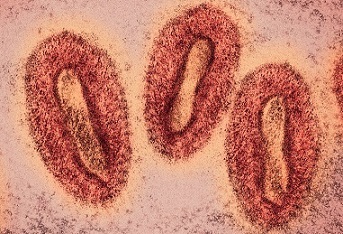BREAKING! New Global Threat From The Emergence In Africa Of A Highly Transmissible Monkeypox Strain With Apobec3-Type Mutations
Nikhil Prasad Fact checked by:Thailand Medical News Team Apr 17, 2024 1 year, 1 week, 2 days, 9 hours, 7 minutes ago
Monkeypox News: The recent discovery of a mutated strain of monkeypox (mpox), known as "clade 1b," in the Democratic Republic of Congo (DRC) has sent shockwaves through the global health community. This Monkeypox News report delves into the intricate details surrounding this emerging threat, from its origins and transmission dynamics to the urgent measures required for containment.
 New Global Threat From The Emergence In Africa Of A Highly
New Global Threat From The Emergence In Africa Of A Highly
Transmissible Monkeypox Strain With Apobec3-Type Mutations
Background: Monkeypox and Historical Outbreaks
Monkeypox, a zoonotic disease caused by the monkeypox virus (MPXV), shares genetic similarities with smallpox. The virus is endemic to Central and West Africa, with two main clades - clade 1 associated with severe disease and high mortality, and clade 2 causing milder illness. In 2022, a notable outbreak linked primarily to sexual contact drew international attention, affecting over 100 countries and predominantly impacting gay and bisexual men.
Emergence of Clade 1b in Kamituga
The latest development in the monkeypox saga is the emergence of clade 1b in Kamituga, a mining town in the DRC. This mutated strain, characterized by increased transmissibility, has raised concerns about its pandemic potential. Kamituga's unique socio-economic and demographic characteristics, including a dense and mobile population, create an environment conducive to rapid virus spread.
https://www.medrxiv.org/content/10.1101/2024.04.12.24305195v2
Transmission Dynamics and Demographics
Unlike previous outbreaks in the DRC, the clade 1b virus in Kamituga has exhibited distinct transmission patterns. It primarily infects adults, particularly sex workers, through sexual contact. The presence of genital lesions among infected individuals highlights a new mode of transmission, complicating traditional containment strategies. Additionally, the virus's ability to evade certain diagnostic tests poses challenges for accurate and timely detection.
Worryingly, about 10 percent of all infected with the new monkeypox strain developed disease severity and required hospitalization with a number dying thereafter.
According to numerous
Monkeypox News coverages, the new monkeypox strain at the moment is spreading extensively among sex workers and miners in the Kamituga town and is likely to have also spread to other countries in Africa by now.
https://www.dailymail.co.uk/health/article-13315983/mutant-strain-monkeypox-pandemic-potential-discovered-Congo-village.html
https://www.telegraph.co.uk/global-health/science-and-disease/mpox-
outbreak-kamituga-democratic-republic-of-congo-africa/
https://www.mirror.co.uk/news/health/monkeypox-warning-after-deadly-new-32603267
Global Implications and Response
The discovery of clade 1b in Kamituga has reverberated globally, prompting calls for swift and coordinated action. Experts emphasize that the outbreak is not confined to a local issue but has significant international ramifications. Urgent measures such as enhanced surveillance, rigorous contact tracing, targeted vaccinations, and strengthening local healthcare infrastructure are imperative to curb the spread of the virus and prevent a potential pandemic.
Genetic Analysis and Timeline of Emergence
Genomic sequencing of the clade 1b virus has unveiled critical insights into its evolution and spread. The presence of APOBEC3-type mutations, associated with enhanced transmissibility, underscores the virus's adaptive capabilities. Analysis suggests that clade 1b likely emerged between July and September 2023, following a spillover event from animals and subsequent human-to-human transmission.
Challenges and Mitigation Strategies
Addressing the Kamituga outbreak poses significant challenges, including limited healthcare resources, population mobility, and gaps in public health infrastructure. Mitigation strategies must focus on rapid case identification, isolation of infected individuals, community engagement, and dissemination of accurate information to combat misinformation and stigma associated with the disease.
Collaborative Efforts and Research Agenda
International collaboration and knowledge-sharing are pivotal in combating emerging infectious diseases like monkeypox. Ongoing research efforts seek to elucidate the clinical severity of clade 1b compared to earlier strains, assess the efficacy of existing diagnostic tools and therapeutics, and identify potential reservoirs and vectors for sustained transmission.
Conclusion: Navigating Uncertainty and Building Resilience
In conclusion, the emergence of clade 1b monkeypox in Kamituga underscores the unpredictable nature of infectious disease dynamics. While challenges abound, proactive measures, informed by scientific evidence and collaboration, offer hope in containing the outbreak and preventing wider transmission. This crisis serves as a stark reminder of the ongoing threat posed by zoonotic diseases and the critical importance of preparedness, surveillance, and global solidarity in safeguarding public health.
For the latest
Monkeypox News, keep on logging to Thailand Medical News.
